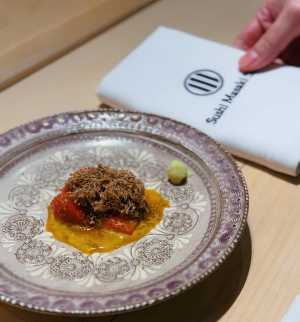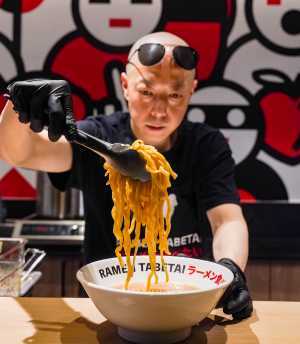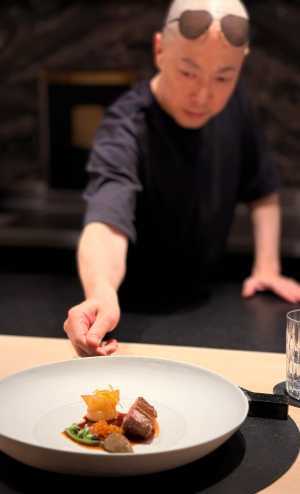I'll admit it — I welcomed the Michelin Guide's arrival in Toronto with a feigned nonchalance. They'd be picking their favourite restaurants, sure, and bestowing a few of them with stars — but these awards can never fully capture our city's food scene, right? They're a tire company, after all. When the night came, though, it was obvious that I'd been lying to myself. My indifference melted away into excitement as I sat, eyes glued to the YouTube livestream, enthralled by each star that was given out.
As the ceremony neared its close, I began to think that no restaurant would achieve more than one star — until it was announced that Sushi Masaki Saito, the infamously priced $680-per-person omakase restaurant in Yorkville, had snagged two. At the time (and until May 2025, when Quebec City's Tanière³ also earned double-stardom), Sushi Masaki Saito had effectively been pronounced the best restaurant in Canada. It was a big deal.
Masaki Saito — dressed in a crisp white shirt, apron and chef's hat — climbed on stage to loud applause. His speech was nothing short of iconic. He introduced himself as Justin Bieber; professed his love for Toronto and Canada; claimed he had been drinking too much to remember what to say ("too drunk, too drunk, too drunk"); and, to a burst of laughter, questioned why he was still single.

That clip plays at the beginning of co-directors Jamal Burger and Jukan Tateisi's new debut feature, Still Single, which premiered at TIFF this year. The film follows the illustrious sushi master for two years, capturing his ethos, humble roots in rural Japan and complicated personal and professional relationships.
Saito studied marine biology before moving to Tokyo to train in the traditional edomae sushi style. He then opened a restaurant in New York, which was awarded two Michelin stars, before moving to Canada in 2019 and opening his eponymous two-Michelin star sushi restaurant. Since then, he's opened two locations of his more reasonably priced omakase restaurant MSSM, along with the mysteriously star-studded LSL. The film offers a glimpse into conversations behind closed doors that led to the opening of the restaurant collaboration between Christian Le Squer, Didier Leroy and Masaki Saito.
I had the chance to sit down with Saito for an exclusive interview about his career, inspirations and thoughts on the film. Server and sometimes sous-chef, Miyuki Nagasawa joined us to help translate.
Swapping his chef uniform for a plain black tee, Saito is engaged, enigmatic and passionate. He's also funny. ("You're a beautiful man," he proclaims. "I think you're smarter than me!") I expect nothing less from the eccentric chef.
What did you think of Still Single's portrayal of your life?
“'Interesting guy,'" Saito grins.
How did your childhood shape the chef you are today?
"I was born in Hokkaido, Japan, in August 1987. My grandma and grandpa are fishermen. My father and mother are not chefs, and not fishermen — they are a nurse and a contractor.
"My grandma and grandpa are from Hakodate, in Hokkaido. Hakodate is a fishing city. Fisherman cities have a fisherman smell ... that natural sea smell. Now, I focus on smell when I cook, when I imagine a menu. This smell comes from what, this smell comes from that, on each plate."
When I was a kid, for summer vacation, I'd go to my mother and grandpa's city to catch [fresh seafood], which I'd cook for myself. I'd really enjoy the vacation. That's a deep memory for me — how tasty it is, even compared to supermarkets ... Even as a kid, I could understand [the difference]."
What brought you to Toronto in 2019?
"I lived in New York for four-and-a-half years before Toronto. [Now the owner of Sushi Masaki Saito,] William [Cheng] came from Toronto to eat at my restaurant in New York many times. I got bored in New York. I wanted to change country or city. When I said I was leaving, many investors and business partners asked me to open a new restaurant in Canada; the U.S.; Japan, of course; Dubai; and Paris.
"I chose William because he's a very simple guy. He is rich,” laughs Saito. “Most importantly, he is a foodie. Even if he has never tried the cuisine, he wants to understand. He wants to learn. His passion and my passion are equal, which is good. No fighting; no suing each other.
"[At that time,] in Canada, there was no [Michelin Guide]. ‘If Canada gets a [Michelin Guide], in future, I will move to Canada, to Toronto,’ I promised him."
What is your favourite part of living in Toronto?
"I love living in Yorkville. Very good people."
What are you like outside of work?
"Professional Saito — with my chef title, when I wear the chef uniform and have my chef face and chef mind — is an aggressive Saito, with passionate energy. When I turn that off, at home, I'm always watching YouTube in my bed. I don't want to go outside. I don't want to drink alcohol a lot. In my fridge, there's no alcohol, only water, sparkling water and soy milk. No food, no cooking, no pan, no chopsticks, no knife. No knife! No cutting board, because I hate cooking for myself. I don't want to cook for myself; I want to cook for others. It's a 180-degree difference when I turn off, I'm a different human."
Where do you like to eat and go on dates in Toronto?
"Recently, we went to Rodney's Oyster Bar, and a few Japanese izakayas — but I love a Michelin-star restaurant for the dating scene. Of course, I want to bring [my date] to a good restaurant, and I want to give them a good experience. So, I love Kappo Sato. [They serve] very, very good Japanese cuisine and have one Michelin star."

How have you seen Toronto change since the Michelin Guide’s arrival? How do you expect it to change in the future?
“Yes, it’s starting to change already, little by little … I’ve felt people change in Canada. People are changing, and people want change. I think [Michelin’s arrival] has caused customers’ minds to change. They want more. Before Michelin, rich people would think, ‘I have money, but I cannot spend it. Where do I spend?’”
Saito says that the guide has opened Toronto diners’ minds to trying new restaurants, potentially at higher price points. But he stresses that it’s not only about fine dining.
“Michelin doesn’t only highlight high-end restaurants — Michelin also highlights sustainability, under-$100 restaurants, along with over-$100 restaurants. It’s a food guide for foodies. So we have the chance to go to a new restaurant for the first time.”
For Saito, the real impact is increased competition.
“Any market is a fight — compare, compete. This is very good. If you don’t compare, you don’t create. You don’t compare, you don’t raise up or grow up. We need to compete more in Canada. Canadian people are too nice. That’s what I felt when I came to Canada. I love Canada. But the too-nice Canadian people are very relaxed. We need action for Canada to grow up.”
In Still Single, you talk about respect. What does that mean to you?
“I always say [to my staff], please ‘talk’ with the ingredients. Please smell, please lick, please listen to the sounds, please touch — feel everything. For me, that’s a kind of respect.”
For Saito, that same respect should also exist between the guest and the chef. He believes diners have a responsibility to honour a carefully curated omakase experience, including not speaking loudly during dinner, being late or wearing a distracting fragrance.
“If a customer is wearing a very strong perfume, I don’t feel respect from them … I want respect, but if I don’t feel respect, I don’t respect you.”

What's a piece of advice you can share with other chefs?
"In the movie, in one scene, I go to the nail salon. I always care about my hands, protect my hands. [I need them] to be more beautiful, softer — not hairy, not dirty. Even for an Italian chef, a French chef, it doesn't matter — everybody needs to do this, and should do this."
More manicures? Why?
"I want to eat at a beautiful restaurant. I want to go to a beautiful restaurant. If the chef has dirty hands? I cannot respect that. A dirty uniform? I cannot respect that, because they have no respect for guests.
"This means we need it to be beautiful, even at a cheaper restaurant … MSSM is $98 per person. I always say, even at under-$100 restaurants, it doesn't matter — please give guests the $300 experience. A customer is a customer."
As a Michelin-star chef, what was it like having a documentary crew follow you around for two years?
"Very stressful. In the movie, you see me go to maybe three, four, five countries? I actually went to 10 countries each year. For me, that was very stressful.
"There was no privacy! In the movie, [there's a scene where] I wake up to the production team in my room. I say, 'Miyuki, you're fired.' When I woke up and saw the camera, I thought, 'Oh, Miyuki gave [the production team] my room key.' So I said 'Miyuki is fired,'” laughs Saito.
That same scene sees Saito, only partially clothed, amiably asking the producers to "cut."
At the beginning of the film, Saito is pictured preparing sushi beside the ocean, as waves crash behind him. "The sushi bar on the Hokkaido beach — that [was filmed] January 2, when it was -10 C. I complained a lot. I said, 'If this film makes money, give it to me.'"
In the film, chef Christian Le Squer says that he needs you, and that you are a star. What does that praise mean to you?
"On the surface, I say thank you so much. I'm so happy. Inside, though, I felt I needed to do more with the chefs to create LSL.
"LSL has three chefs. [What Le Squer] meant was 'we need you.' It's a sign that I should be doing more to support chef Didier Leroy. Even though I don't know French techniques, what more can I do?"
What has it been like working alongside chef Christian Le Squer and chef Didier Leroy?
"[LSL] is very unique. [At the beginning], it was hard to work with each other. I've never heard of three chefs in different locations opening a restaurant.
"I had double the interest in French cuisine after opening LSL. I go to French restaurants more to eat because I need the experience, and I want to know more. So after I learn more, I'm able to contribute more ideas … I hope [LSL is] a Michelin-star potential restaurant. It's been a very good experience, and LSL gave me a chance to grow [by learning] another cuisine."
View on Instagram
In the documentary, chef Le Squer also claims that Sushi Masaki Saito deserves three Michelin stars. Do you agree?
"In that scene, I didn't think so. But now I have more confidence. [Every year, I get more confidence], because I know I can grow even more. Usually I don't care about three Michelin stars; I don't focus on the Michelin stuff. I always focus on tonight's customer, tomorrow's customer, next week's customer ... Michelin stars are like a kind of bonus. This year, if they say 'very good job,' maybe I'll get three Michelin stars. This year, if they say 'great job,' maybe just one Michelin star."
Do you consider yourself to be successful?
"So many people tell me I'm successful. But I didn't always feel successful, and I don't care about success. Even if I'm rich, I don't care. If I were very poor, maybe I’d care more about money, but I'm not greedy.
"I am not rich. People look at me and think ‘oh, he's rich.’ No, no — I spend a lot on everyone. I don't save my money.
"I think I am successful now, but I want to do more. I need to do more. I'm not enough. That doesn't mean making money … I want to make new categories [for restaurants] in Toronto, in Canada, to inspire people to open more restaurants and create jobs in the future."
What is next for you?
"I want to retire within seven years, eight years, maybe. Next week, I’ll be 38 years old. My aim is to retire before 45. I want to volunteer, to give more to charity, and have no money.
"Some people might feel after watching Still Single, 'Oh, I am still single too.' I want to help; I want to support those people. For example, a single mother who needs to make money ... What can I do [to help them]? I can cook for you for free. I'll ask Whole Foods, ask Walmart, if you have wasted food, give it to me. Don't throw it out.
"I am not a beautiful man, because I am doing [all of this] for me. If there's a heaven or a hell, I want to go to heaven. So I need to do more to make other people happy. Karma."
Still Single will be released across Canada in November.
This interview has been edited for length and clarity.
